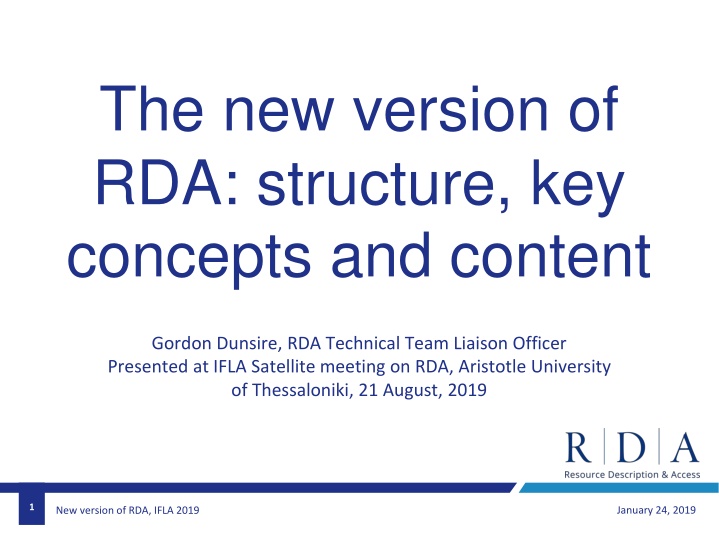
New Version of RDA: Key Concepts and Structure
Explore the latest version of RDA as presented at the IFLA Satellite meeting, focusing on the structure, key concepts, and content. Learn about the implementation of RDA as an extension of the Library Reference Model (LRM), the equal treatment of RDA elements, and the modular structure that supports context. Discover the distinct kinds of data recording methods and the importance of transcription in manifestation statements. Stay updated on the developments in RDA and its impact on the information landscape.
Download Presentation

Please find below an Image/Link to download the presentation.
The content on the website is provided AS IS for your information and personal use only. It may not be sold, licensed, or shared on other websites without obtaining consent from the author. If you encounter any issues during the download, it is possible that the publisher has removed the file from their server.
You are allowed to download the files provided on this website for personal or commercial use, subject to the condition that they are used lawfully. All files are the property of their respective owners.
The content on the website is provided AS IS for your information and personal use only. It may not be sold, licensed, or shared on other websites without obtaining consent from the author.
E N D
Presentation Transcript
The new version of RDA: structure, key concepts and content Gordon Dunsire, RDA Technical Team Liaison Officer Presented at IFLA Satellite meeting on RDA, Aristotle University of Thessaloniki, 21 August, 2019 1 January 24, 2019 New version of RDA, IFLA 2019
Library Reference Model RDA is an implementation of the LRM RDA is an extension of the LRM All RDA entities and elements are equivalent or narrower sub-types of LRM entities, relationships, and attributes. Corporate Body and Family are sub-types of Collective Agent RDA entities are encapsulated under RDA Entity RDA Entity is a sub-type of LRM Res 2 New version of RDA, IFLA 2019
Structure All RDA elements are treated equally No relationship designators in appendices Instructions for recording an entity or element are grouped under the entity or element Each has its own page Element pages are grouped in entity chapters General guidance on special topics is provided separately Modular structure supports context 3 January 24, 2019 New version of RDA, IFLA 2019
4 New version of RDA, IFLA 2019
Recording methods Four distinct kinds of data 1. Unstructured description: keyword indexes Transcriptions, notes; flat-file applications 2. Structured description: browse indexes, parsing Derived, compound values; bib/authority applications 3. Identifier: direct indexes Local scope; relational database applications 4. IRI (URI): Semantic web Global scope; linked open data applications 5 New version of RDA, IFLA 2019
Transcription Context: How a manifestation describes itself Principle of representation Basic transcription is optimized for machine intermediation Optical character recognition software Normalized transcription preserves the current RDA approach Other transcription rules may be applied 6 New version of RDA, IFLA 2019
7 New version of RDA, IFLA 2019
Manifestation statements LRM attribute that accommodates the principle of representation RDA provides a set of sub-types that have an approximate alignment with ISBD e.g. manifestation edition statement Unstructured description: the value is obtained by direct transcription, with or without transliteration 8 New version of RDA, IFLA 2019
Appellations and Nomen Nomen entity treats an appellation as a thing that can be described separately Name authority control An appellation is a string that references an entity Name/title, access point, identifier RDA provides specific elements for appellations e.g. title of work; access point for person; identifier for place 9 New version of RDA, IFLA 2019
Appellations and recording methods The string value of a relationship element must be an appellation of the related entity Related person of work: Gordon Dunsire Dunsire, Gordon nb2001072552 Appellation element Name of person Access point for person Dunsire, Gordon Structured description Identifier for person nb2001072552 Value string Gordon Dunsire Unstructured description Recording method Identifier 10 New version of RDA, IFLA 2019
Data provenance Metadata about metadata Who created the metadata? When? Using what standards? etc. RDA treats a metadata description set (one or more statements) as a Work The work is described using RDA Provenance is optional But is essential in the context of fake news Fake metadata 11 New version of RDA, IFLA 2019
Options RDA does not assume that all, or most, Toolkit users will make the same choices What entity to use in a hierarchy? What element to use? What relationship element to use in a hierarchy? Record the first value, any value, or all values? Etc. 12 New version of RDA, IFLA 2019
Choices Optional instructions are explicitly presented, often associated with conditions that provide a context Guidance and instructions indicate that entity and element hierarchies and appropriate recording methods provide choices All levels of choice have active links and citation numbers 13 New version of RDA, IFLA 2019
Boilerplate: consistent phrasing 14 New version of RDA, IFLA 2019
Restrictions Well-formed RDA metadata must conform to the semantics of the LRM and RDA Coherent description: FRBR primary elements and cardinality Minimum description: At least one appellation element 15 New version of RDA, IFLA 2019
16 New version of RDA, IFLA 2019
Consistency Semantic conformance allows RDA metadata to interoperate at lowest common denominator global level Via entity and element hierarchies Interoperability of metadata values requires conformance with local choices for strings Via authority processes 17 New version of RDA, IFLA 2019
Application The new RDA Toolkit is ready for: The cloud of metadata processing Smart metadata Slightly dumber metadata Multilingual metadata Local applications in a global network Individual, institutional, national, and international choice 18 New version of RDA, IFLA 2019
Thank you! techo@rdatoolkit.org 19 New version of RDA, IFLA 2019
